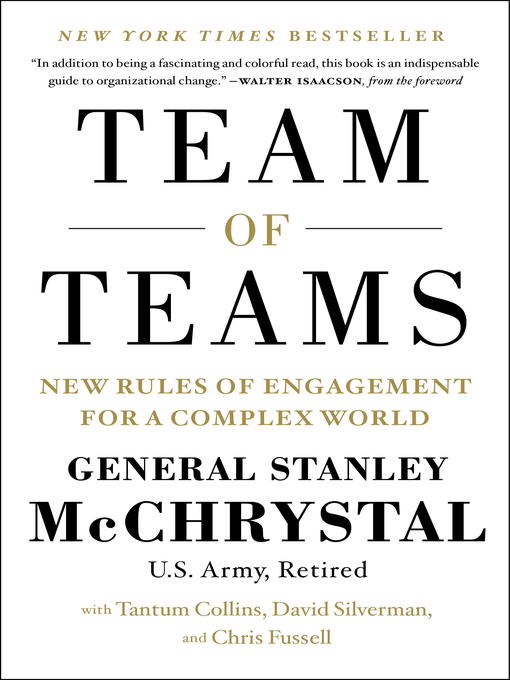Team of Teams
New Rules of Engagement for a Complex World
When General Stanley McChrystal took command of the Joint Special Operations Task Force in 2004, he quickly realized that conventional military tactics were failing. Al Qaeda in Iraq was a decentralized network that could move quickly, strike ruthlessly, then seemingly vanish into the local population. The allied forces had a huge advantage in numbers, equipment, and training—but none of that seemed to matter. To defeat Al Qaeda, they would have to combine the power of the world’s mightiest military with the agility of the world’s most fearsome terrorist network. They would have to become a "team of teams"—faster, flatter, and more flexible than ever.
In Team of Teams, McChrystal and his colleagues show how the challenges they faced in Iraq can be relevant to countless businesses, nonprofits, and organizations today. In periods of unprecedented crisis, leaders need practical management practices that can scale to thousands of people—and fast. By giving small groups the freedom to experiment and share what they learn across the entire organization, teams can respond more quickly, communicate more freely, and make better and faster decisions.
Drawing on compelling examples—from NASA to hospital emergency rooms—Team of Teams makes the case for merging the power of a large corporation with the agility of a small team to transform any organization.
-
Creators
-
Publisher
-
Release date
May 12, 2015 -
Formats
-
Kindle Book
-
OverDrive Read
- ISBN: 9780698178519
- File size: 1554 KB
-
EPUB ebook
- ISBN: 9780698178519
- File size: 1672 KB
-
-
Languages
- English
-
Reviews
-
Publisher's Weekly
March 23, 2015
Retired U.S. general McChrystal (My Share of the Task) and his coauthors draw on their respective military and management experience to construct this well-written business book about “what’s different in today’s world and what we must do about it.” There’s some heady stuff in here, including precise descriptions of military procedure, and detailed explorations of the valuable lessons the military has learned recently about collaboration. As McChrystal notes, that change hasn’t been easy for an organization that long prided itself on a strict “command-and-control” flow of power and “need to know” philosophy. The resulting book is a collection of innovations that the modern U.S. Army has embraced—and that most corporations can too. In the new paradigm proposed here, the focus is on “adaptability” instead of “efficiency,” promoting “generalized awareness,” and empowerment. The authors’ abundance of material is made manageable by good organization and some surprisingly strong writing. There are only a few non-military examples (such as GM and Ford’s contrasting organizational approaches), so readers not interested in military strategy may leave this book unfinished; for any other businesspeople, it will get a definite thumbs-up. Agent: Robert Barnett, Williams & Connolly. -
Kirkus
April 1, 2015
Former leader of the Joint Special Operations Task Force in Iraq lends his gutsy insight to the management breakdown of that effort, which ushered in huge changes from the top down. Replaced in 2010 as head of U.S. forces in Afghanistan for his outspokenness, now retired from the Army and teaching leadership at Yale, McChrystal, along with three co-writers, fashions an engaging narrative on how the traditional centralized management style of the American forces no longer worked against the fluid, agile enemy of jihadi terrorist networks. His work is essentially a chronicle of his ability to lead a sea change in military management style between 2003, when he joined the Task Force, and the triumphant assassination of Abu Musab al-Zarqawi, the Jordanian-born head of al-Qaida in Iraq, in 2006. Frustrated by the protean nature of the enemy, which constantly undermined the rigid discipline and superior force of the U.S., McChrystal and his cohorts had to step back and take stock of some leadership models in history-e.g., British Adm. Horatio Nelson engineered a stunning victory over a superior Franco-Spanish fleet at the Battle of Trafalgar in 1805 by creating chaos and uncertainty in the enemy command. The authors also examine the ideas of Frederick Winslow Taylor, who initially established the supremacy of the centralized business structure. In a showcase at the 1900 Paris Exposition Universelle, Taylor introduced the art of "scientific management," by which factory conditions moved like clockwork, where there was "the one best way" for production and all causes and effects were predictable. However, by the first Iraq War, the military had boxed itself into an outmoded Maginot Line rather than rewarding fluidity, agility, resiliency, and adaptive thinking. Creating teams and lateral trust altered an entire military culture. Despite some boggy, unspecific acronym-speak, the authors offer useful examples and takeaway advice.
-
Loading
Why is availability limited?
×Availability can change throughout the month based on the library's budget. You can still place a hold on the title, and your hold will be automatically filled as soon as the title is available again.
The Kindle Book format for this title is not supported on:
×Read-along ebook
×The OverDrive Read format of this ebook has professional narration that plays while you read in your browser. Learn more here.


